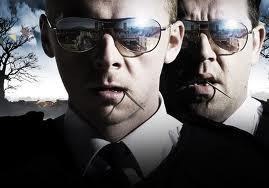Angela Slatter's Blog, page 197
October 26, 2010
New feature: a Bestiary
A Flying Monkey Drive-by: Aidan Doyle
October 25, 2010
Wooot! Publishers Weekly reviews Sourdough and Other Stories
October 21, 2010
Awesome Post
October 20, 2010
Hint
October 19, 2010
A Mondy Drive-by: Ian Mond
October 18, 2010
A word from Alan Baxter
Rising, Not Dreaming
Steampunk Reloaded
October 14, 2010
Good Cop, Bad Cop: On Interrogating the Story
 So, you write a first draft. Then you put it in the bottom drawer, let it cool its heels for a while, see. Make it nervous. The more time it spends alone, the more it starts to need some human interaction. The more time you leave it there, the more you think about it, get inside its head. The more time it spends alone, the more eager it will be to talk. Maybe you bring a friend along for the interrogation, play good cop-bad cop, see. Slap it around a little … Oh, wait.
So, you write a first draft. Then you put it in the bottom drawer, let it cool its heels for a while, see. Make it nervous. The more time it spends alone, the more it starts to need some human interaction. The more time you leave it there, the more you think about it, get inside its head. The more time it spends alone, the more eager it will be to talk. Maybe you bring a friend along for the interrogation, play good cop-bad cop, see. Slap it around a little … Oh, wait.
Sorry, this isn't the 'write a cheesy cop drama script' post, is it?
It's the 'questions to ask your first draft' post.
Okey dokey.
As I said before being possessed by the spirit of James Cagney, when you've written a first draft you need to look over it with an editor's eyes. It's best not to steal actual editors' eyes – they get upset and I won't be doing that again – and it's also something you need to develop for yourself. Again, do not attempt to steal then transplant actual editors' eyes. One of the things you do can to assist in your own improvement as a writer is to make a list. Check it twice. A list of questions you need to ask when you're revisiting the first draft. As always, this isn't law (or indeed lore), just some advice based on my experiences, which others may find helpful. I long ago accepted that my function in life was to act as a warning to others.
1. Dialogue: Do all my characters sound the same? Do they all use the same quirks of speech, slang, rhythms, cadences? If I were to be locked in a dark room with all my characters, would I be able to distinguish them, one from the other, by their how they spoke or would they all sound like some polyglot-esperanto mishmash? This doesn't mean giving one an outrageous accent, for accents also hold nasty pitfalls for the writer (newbie and experienced).
2. Characters: Are my characters stereotypes? Have I made them interesting? If they are not sympathetic, then at least are they engaging enough to keep a reader reading? Have I given each of them some little personality distinctions so that a reader doesn't think the Clone Wars has come to my story?
3. Descriptions: Are they convincing? Are my descriptions of actions true to life? i.e. if you're not sure about something you've described a character doing, then try to do it yourself. If you put your back out/chop off a finger doing it, then chances are you need to rethink what you've written. Also, your descriptions of physical surroundings – are they (a) believable, (b) accurate (if you're writing about a real place, make sure you get things like the name of a capital city right, correct weather patterns, vegetation, flora, etc), and (c) sketched skilfully and not overdone.
4. Plot consistencies: Is your plot consistent? Does a character's motivation suddenly and mysteriously change halfway through the story for no reason? Does the beginning of the story match the end? i.e. Does the story you set out to tell in your first paragraph relate to the end of the story you've told? Is everything that was promised paid off? Have you completely forgotten to finish a character's arc? Are there holes through which one could drive a relatively large track? At the end of things, does your story make sense? Is there an internal logic which will be obvious to a reader, not make s/he scratch her/his head in confusion?
5. The textual stuff: This covers things like repetitions of words and phrases, i.e. those that are not intentional and carefully considered for reasons of rhyme and cadence and layering of your prose. Also, what are your crutch words, the ones you use over and over because you're a lazy writer? Create a search and destroy list that you can check over time you write a story (please, no matter who you are, put "suddenly" at the top). Do you have something that happens in every one of your stories? Mine is having my characters eating bread and cheese. This reflects my obsession with bread and cheese, but I realise that in draft number two, I need to change the menu.
Sooooo, these are just the ones off-the top of my head. Add your own. These are also first principles kinds of things, the stuff we sometimes forget, but should be running like a background program all the time. A list beside the desk is a good reminder. Off you go – go all Hot Fuzz on that story's ass.











